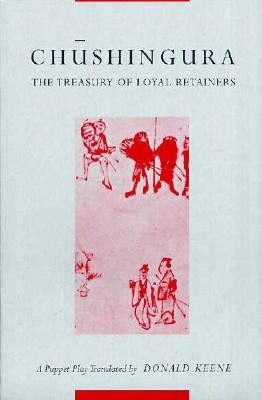| Chushingura (the Treasury of Loyal Retainers): A Puppet Play Contributor(s): Keene, Donald (Translator) |
|
 |
ISBN: 0231035314 ISBN-13: 9780231035316 Publisher: Columbia University Press OUR PRICE: $29.70 Product Type: Paperback Published: April 1971 Annotation: Chushingura (The Treasury of Loyal Retainers), also known as the story of the Forty-Six (or Forty-Seven) Ronin, is the most famous and perenially popular of all Japanese dramas. Written around 1748 as a puppet play, it is now better know in Kabuki performances. In the twentieth century, cinema and television versions have been equally successful. Donald Keene here presents a complete translation of the original text, with notes and an introduction that increase the reader's comprehension and enjoyment of the play. The introduction also elucidates the idea of loyalty. This traditional virtue, as exemplified in Chushingura, has never completely lost its hold on audiences, in spite of twentieth-century changes in Japanese society and moral ideas. Moreover, as Professor Keene points out, the excitement, color and violence expressed in the play may be considered the counterpoint to the austere restraint and understatement which are more commonly thought to be "traditionally" Japanese. |
| Additional Information |
| BISAC Categories: - Drama | Asian - Japanese - Performing Arts | Puppets & Puppetry |
| Dewey: 895.6 |
| LCCN: 78142283 |
| Series: Translations from the Asian Classics |
| Physical Information: 0.53" H x 5.32" W x 7.98" (0.50 lbs) 212 pages |
| Descriptions, Reviews, Etc. |
| Publisher Description: Chushingura (The Treasury of Loyal Retainers), also known as the story of the Forty-Six (or Forty-Seven) Ronin, is the most famous and perenially popular of all Japanese dramas. Written around 1748 as a puppet play, it is now better know in Kabuki performances. In the twentieth century, cinema and television versions have been equally successful. Donald Keene here presents a complete translation of the original text, with notes and an introduction that increase the reader's comprehension and enjoyment of the play. The introduction also elucidates the idea of loyalty. This traditional virtue, as exemplified in Chushingura, has never completely lost its hold on audiences, in spite of twentieth-century changes in Japanese society and moral ideas. Moreover, as Professor Keene points out, the excitement, color and violence expressed in the play may be considered the counterpoint to the austere restraint and understatement which are more commonly thought to be "traditionally" Japanese. |